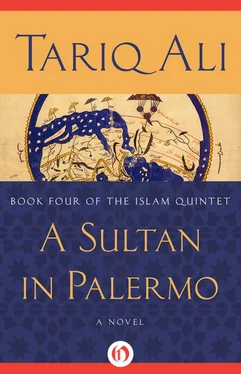The Trusted One was of the same opinion. He had engaged in a number of conversations with Uthman in the library and was amazed that he knew where every single book was located and, of the books he himself had read, he could cite page numbers and references without any problems.
‘Perhaps only a part of his mind has ceased to function. The rest is fine. This is the part of the human body of which we physicians know the least.’
One night after the evening meal, they gathered around a fire that had been lit outside, ate dried fruits and sipped wild mint tea underneath the stars. It reminded Idrisi of his youth. He took Elinore aside and pointed at the lights of a distant village.
‘I used to ride there once a day just to catch a glimpse of your mother.’
‘And my aunt?’
‘No, you wretch. She was far too young to be taken seriously.’
Abu Khalid suggestively cleared his throat and Idrisi and Elinore returned to the family circle. Idrisi spoke of the deaths in the family and praised his late wife for the efficient way in which she had run the estate. An unexpected reflection interrupted him.
‘I wish Walid were present to hear you say that, Abu. It would have made him happy.’
Idrisi smiled. ‘I, too, wish he was here, Uthman. May Allah protect all my children.’
He described how it had been a hilly wasteland when his grandfather first arrived one summer. It had taken them six months alone to dig the stones from the soil for the first few terraces. Many of the stones had been used to build the house. When the winter rains came, the earth was transformed, the hills turning green and the streams overflowing. Only then were they certain they had made a good choice.
‘And now we have hard decisions to take. Even if I remain on this island I will never live here again. Sakina lives with her family. Abu Khalid and Khalid are happy on their own estate. Uthman, of course, will live here with his friends, but he cannot manage the estate. The peasants who work these estates, like their forebears before them, will suffer greatly if we were to sell the estate. I was wondering how we should solve this problem when Khalid told me that he and his father had invited the Trusted One to join us. So I turn to him. Holy man, if that is what you are, explain to us how we will teach the peasants to bear false witness with brazen faces in order to defend themselves against the future. We have all heard of the village where miracles took place after your visit.’
The demeanour of the Trusted One had altered since he had met Bulbula’s sister. He had cut his hair short and trimmed his beard. He bathed more regularly and wore clean clothes, all this partly in response to a heartrending plea from Bulbula’s sister. But he was also aware that descriptions of him were circulating all over the island and that the swinish Lombards would soon seek their revenge.
The scholar had posed questions that required a response. ‘Learned Master Idrisi, I thank you and your family for the hospitality you have given me. As I see it, there are few problems with this estate. The peasants have not been mistreated and they are all Believers. The size of the estate is not excessive. I have been making some estimates. There are a hundred peasant families in addition to six retainers in the household.’
‘In fact, Trusted One,’ said Uthman, ‘there are one hundred and three families and eight retainers. You forgot to count the butcher and the wood cutter who eat daily in our kitchen.’
‘I thank you for correcting me, Uthman ibn Muhammad. There is enough land here to be divided among these families. That will still leave sufficient land to maintain the estate, not as before but certainly without creating a problem. Then there is the question of bearing false witness. This is unnecessary for Ibn Muhammad will himself sign the papers of transfer and these can be registered in Noto. The problem is the future. If we are defeated, the only way for the peasants to keep the land is to pretend they are Nazarenes. You have a small mosque here, but no church. I think we need one. Greek not Latin. It’s simpler. If the peasants agree, I have seen a site where it could be constructed quite easily. Once that is done, we will need a monk and a register where he will testify he converted this village the day Rujari died to honour his memory.’
‘Trusted One,’ Uthman asked in a nervous voice, ‘will my friends be forced to become Nazarenes?’
‘What are they at the moment?’
‘They are neither Believers nor Nazarenes. They still worship the old Greek god, Poseidon.’
‘It will not be necessary for them to convert.’
‘I won’t either.’
‘That will not be a problem.’
‘Perhaps all this can be done,’ said Idrisi, ‘but our peasants are very religious and I am doubtful whether they will agree to change their religion to keep their land.’
‘This is a strange island,’ said the Trusted One. ‘Its climate and its way of life have a way of affecting everyone. The choice is either to let the tyrant reap the seed they have sown and be driven off the land or to pretend they have been baptised. They can pray to Allah five times a day in the field or at home. But the choice is for them, not for you or me. That much I learnt from the other village. We had won, but the peasants were scared of reprisals. And to promise them that there would be no revenge killing because we were going to be victorious and re-take the island was unconvincing. I’m not sure whether that is possible, given our present state, so how could I convince anyone else? It was then that I thought of conversions planned by us as a counter to those forced on our people by a sword. Where’s the harm? Allah be praised, if we win. If we lose, let us ensure the peasants and their families are secure even though we may not be. It is the least that can be done for them.’
‘It is sensible advice, I grant you,’ said Idrisi. ‘But on this estate they have not had to struggle against adversity and that has given them a remarkable self-confidence. I will back your advice.’
Elinore and her husband discussed their future through the night. She wanted to leave Siqilliya, but he wanted to stay so that their children would be born here. He reminded her that his family had lived in Siracusa since the town was built. She argued that she could not bear her children being brought up in the midst of bloodshed and uncertainty. If Rujari, whom she had loved, could kill Philip whom she had admired, the bloodletting on this island would never stop. He leaned and whispered something in her ear which made her laugh. It was a deep, throaty laugh, uncalculating and straight from the heart.
‘Does that mean we have reached a compromise, my lady?’
‘Blow out the candle, Simeon, and let me sleep. You will know in the morning.’
The next morning, the sound of the flute woke her. By the early morning light at the window she saw him, his face leaned sideways, his eyes gazing sadly at the distant sea. She had never realised that music could have such an effect on her. Now she wished she had bowed to her mother’s pressure and learnt how to play the lute when they still lived in the palace. She had made up her mind, but would tell Simeon later.
The Trusted One had woken early so he could speak with the peasant families. He had organised a mehfil for the late afternoon, an hour before they usually finished working in the fields. All they had been told was that Ibn Muhammad al-Idrisi had returned to the estate and wished to consult with them. Sakina was already in the kitchen supervising the food that had to be prepared to feed the assembly.
Idrisi had taken Uthman on a walk to breathe the air and inspect the fruit trees. Uthman proved himself knowledgeable here as well, looking closely at each tree and estimating the fruit it would bear later in the year. His constant urge to assert himself delighted his father, who wondered whether they had left him on his for too long and whether talking to him each day and treating him as a normal person might not have partially cured him.
Читать дальше












